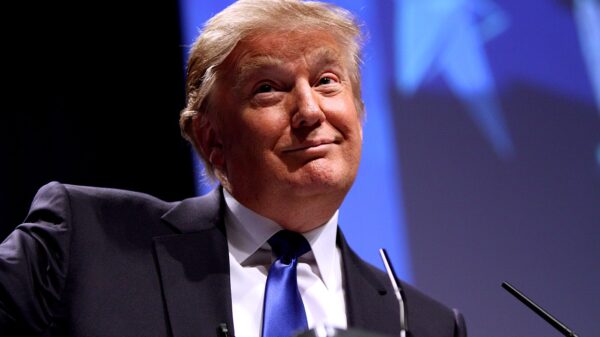Guest Writer, and Vice-President of EISKA, Erik Metaliaj examines the foreign policies of the two US Presidential candidates and illustrates the divergent paths presented by this year’s election.
On 5 November, the United States of America will elect their president for the next four years. This year’s election has an air of significance, suggesting even more weight than the occasion typically brings. Due to their vast differences in ideology and beliefs, Donald Trump and Kamala Harris present two very different paths for the USA, with potential reverberations, at home and abroad, that will last much longer than the forthcoming presidential term. With the US being largely regarded as the global hegemon, this election impacts not only those living in the US but arguably on a global scale.
Tuesday’s vote is predicted to be extremely close, with some commentators and analysts claiming the result will come down to the suburbs of certain swing states. With the result still unknown, this article is not here to discuss probability or provide predictions; it’s here to discuss the what-ifs on a global scale.
A Donald Trump Victory
The world has already experienced four years of a Donald Trump presidency, culminating in an election result he refused to accept. The Republican rule of America left an impact still felt globally. Trump’s ideology of ‘America First’ led to major shifts in foreign policy, such as the threatened withdrawal from NATO due to the Republican’s hawkish position towards the financial contributions of other nation-states. As NATO’s largest contributor, the US leaving would have demonstrated a crisis for other members, potentially leading to further instability and security issues with Russia. Throughout Joe Biden’s presidency, this sentiment of disdain towards NATO has remained for a sizeable portion of the public. This sentiment was not specific to NATO, with Trump’s first administration showing disdain towards international institutions in general, such as the UN, WTO and WHO.
Seeing Trump’s ideology progress further right after the end of his first term, it is inferable that his foreign policy would also progress further into isolationism. This would likely put a large strain on relations regarding the European Union, with the US potentially withdrawing from multilateral or bilateral agreements. When it comes to NATO, Trump already threatened to upend Article 5, meaning he’s likely to propose it again or, as some fear, completely withdraw from the alliance. This would open NATO members to threats such as those posed by Russia.
Russia’s war in Ukraine has been a key issue for NATO since 2022, with threats of the war spreading further into Europe. NATO’s mere existence, with Article 5 stating “an armed attack against one… shall be considered an attack against them all”, has been a deterrent to this, however, without their biggest contributor, NATO would be weakened and open to the threat of Russia.
On a related note, Trump has also demonstrated scepticism towards providing aid for Ukraine. According to Statista, the US has been the largest provider of aid to Ukraine, providing a total of $92.7 Billion in military, financial and humanitarian aid between the invasion of 2022 and 31 August 2024. Should this key source of aid be withdrawn, Ukraine will be at risk of losing the war, again opening Europe to the threat of further Russian aggression.
On the climate, Trump’s withdrawal from the Paris Agreement accurately summed up his position on global warming. Should Trump be re-elected, he would likely repeal the Biden-era climate initiatives. Reuters reported that Donald Trump has “promised to gut” Biden’s ‘climate subsidies’ if elected.
In regards to the Middle East, Trump’s attitudes towards Iran during his first term can be characterised as hostile, withdrawing from the Iran nuclear deal, imposing sanctions on Tehran and frequently openly criticising their support for militant groups in the region. With Trump’s shift towards isolationism, it is unclear whether this will involve a withdrawal of relations entirely or a worsening of hostilities.
Considering the region in general, Trump focussed on military disengagement, with the aim of reducing US military involvement in long-lasting conflicts, such as Afghanistan. This attitude, along with his isolationist instincts, could hint at a certain indifference towards Iran. Rising tensions in the region due to Israel’s actions in Gaza, alongside Trump’s demonstrated commitment to Israel, could see the US backing Israel in any regional issue/conflict, regardless of the state’s actions.
Reuters reported on 16 August that Trump criticised the Biden-Harris Administration’s calls for a ceasefire in Gaza while also telling Benjamin Netanyahu to “get this over with”, adding later, “I will give Israel the support that it needs to win, but I do want them to win fast.” This unwavering support for Israel could show signs of a divergence from his isolationism, with potential exceptions to US retrenchment being made for Israel.
The rise of China and the BRICS countries is another key area that will prove challenging during the next presidency. Trump’s approach to this will likely mirror his previous attitudes towards China, with higher tariffs (potentially in excess of 60%) and more sanctions, threatening a trade war worse than the one seen during his presidency. This continuation of a trade war, alongside Trump’s descent into isolationism, would further worsen the relationship with China and extend the process of economic decoupling,
A Harris Victory
Kamala Harris presents an alternative to the Republican nominee, yet maintenance of the status-quo. Vice President Harris has demonstrated, during her time in office and on the campaign trail, that she will present a continuation of Democratic values and beliefs in an adamant challenger to Trump’s isolationism. Ultimately, aiming to maintain the US’s role as the global hegemon.
Harris’ approach to NATO and the EU will likely continue the diplomatic focus President Biden has demonstrated, focussing on furthering relations with the EU and maintaining a strong ties with NATO.
On the Russia-Ukraine war, this will likely involve continued (if not stronger) support for Ukraine, politically, militarily and financially. This will provide stability to the region, and Europe in general.
Regarding the Middle East, Harris will likely attempt diplomatic approaches to key issues, aiming for multilateral talks with Iran and maintaining support for Israel while also calling for a ceasefire in Gaza, as she has done over the past few months.
Again, regarding China and the BRICS states, Harris will likely push for diplomatic solutions to rising tensions regarding: trade, human rights, and geo-politics. This focus on diplomacy, however, does not mean VP Harris’ stance won’t be tough. The nascent challenge of a potential multipolar world order means the US must maintain a tough stance on certain issues to keep their position as hegemon, which Harris is likely to do.
Isolationist Instincts or Diplomatic Demonstrations
Trump’s isolationist instincts and Harris’ diplomatic demonstrations have presented two very different plans for the future of the US’ foreign policy. The implications of this election will last for years to come. Challenges such as heightened tensions in the Middle East, the rise of China, an emerging multipolar world order, and a rapidly deteriorating climate have placed the idea of US global hegemony at risk – be that a good or a bad thing. Overall, this election provides two distinct options to the American populous: a return to isolationism under Trump, unseen since the pre-Woodrow Wilson Era, or a continuation of the status-quo under Harris.
















